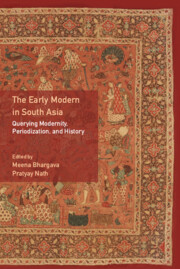1 - Introduction: History and the Politics of Periodization
Published online by Cambridge University Press: 06 September 2022
Summary
In concluding the second volume of The History of Bengal, the doyen of Indian historians, Sir Jadunath Sarkar, lyrically wrote about the demise of the independent Nawabi of Bengal and the emergence of Company rule. As the final episode of Mughal rule in the province, Nawabi rule had brought only misery all around, he argued. As the ruling class indulged in debauchery, factionalism, sadism, and the pursuit of self-interest, the common people had been plunged into ‘deepest poverty, ignorance and moral degradation’. Articulating textbook pro-British sentiments, he went on to say that the victory of the English East India Company had released ‘the rational progressive spirit of Europe’ upon this ‘hopelessly decadent society’. Through the gradual establishment of British civil administration, military power, economic structures, and general stabilization of law and order, the region had begun to flourish. This had ushered in an era of rejuvenation of every sphere of social, cultural, and political life. Sarkar argued:
It was truly a Renaissance, wider, deeper, and more revolutionary than that of Europe after the fall of Constantinople … under the impact of the British civilization it [Bengal] became a pathfinder and a light-bringer to the rest of India…. In this new Bengal originated every good and great thing of the modern world that passed on to the other provinces of India.
Published in 1948, these lines echoed what another historian Susobhan Sarkar had put down just two years back in a political pamphlet for leftist activists operating in Bengal against the backdrop of the impending partition of India. Here he had outlined his thesis about the ‘Bengal Renaissance’ – a term he had used to designate what he saw as a religious, intellectual, cultural, and political reawakening in nineteenth-century Bengal. For him, it had been produced by the ‘impact of British rule, bourgeois economy and modern western culture’ and had heralded the advent of modernity in and the beginning of modernization of India. What Susobhan Sarkar wrote for a non-academic readership, Jadunath Sarkar articulated for an academic one. Together, their arguments represent some of the early interpretations of a set of historical processes that had engulfed Bengal for most of the nineteenth century.
- Type
- Chapter
- Information
- The Early Modern in South AsiaQuerying Modernity, Periodization, and History, pp. 1 - 40Publisher: Cambridge University PressPrint publication year: 2023

